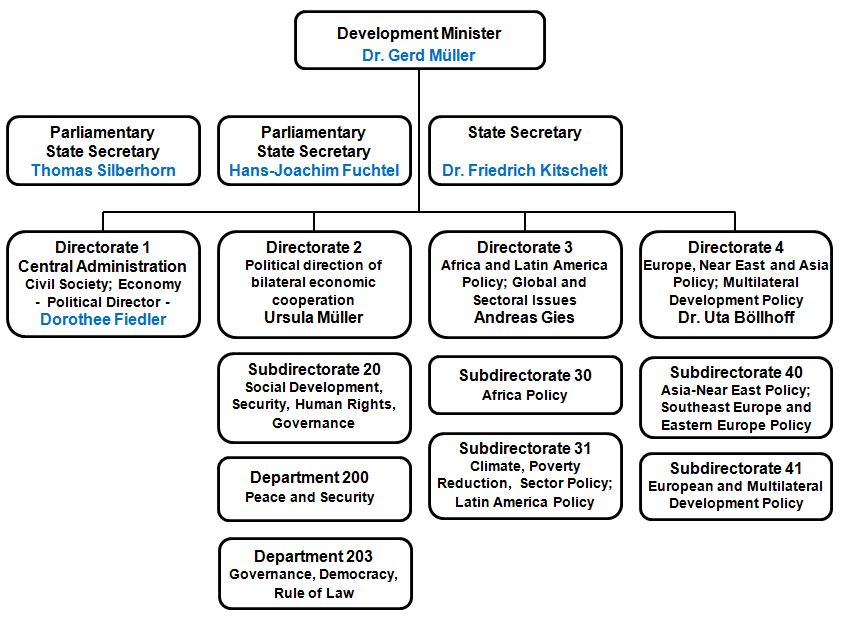Ministry for Economic Cooperation and Development
Stephan Wallace
Defense and Security Policy Analyst
Stephan Wallace is a defense and security policy analyst following political, military, and economic developments in Europe. He has worked more than 33 years on this area for the U.S. government, most recently for the U.S. Department of Defense.
German development policy is an independent area of German foreign policy formulated by the Ministry of Economic Cooperation and Development (BMZ). However, aid to developing countries is increasingly linked to crisis prevention and conflict resolution strategies, especially in fragile or failed states, such as Afghanistan and Mali. As the ministry stated in its latest development policy white paper, “there can be no development without security and no security without development.”[1]
Select foreign and security policy leadership positions in the Ministry for Economic Cooperation and Development
Dr. Gerd Müller (CSU) is the new Minister for Economic Cooperation and Development, taking over the ministry led by Free Democrat Dirk Niebel in the previous government. Müller served as Parliamentary State Secretary in the Agriculture Ministry from 2005 to 2013, and was responsible for international relations, third-world development projects, and world food aid programs, among other issues. As a member of the Bundestag since 1994, he served on the committees for foreign and defense policy and was the spokesman on Europe, foreign, and development policy for the CSU deputies group.[2] In this position, he challenged the Finance Minister’s defense of Greece’s participation in the euro zone during a speech to the Bundestag in 2000, warning that the country was over-indebted and unprepared and that its participation in the euro zone would undermine trust in the common currency.[3]
- Soon after taking office, Müller called for a fundamental reform of the World Trade Organization (WTO), which he said has put too much emphasis on free trade and not enough on enforcing international social, ecological, and conservation standards necessary for sustainable economic and human development.[4]
- Müller also announced in late January that his ministry will be developing a new policy concept for Africa over the next few months as part of a larger effort to address challenges to security and stability in places like Mali and the Central African Republic. He noted that German development assistance personnel and military troops are pursuing the same goals, only with different though complementary instruments.[5]
Thomas Silberhorn (CSU) became Parliamentary State Secretary on 17 February after the CSU tapped its initial choice, Christian Schmidt, to replace Hans-Peter Friedrich as Minister of Agriculture. Schmidt had brought useful experience and contacts from his eight years as Parliamentary State Secretary in the Defense Ministry and quickly introduced ideas for greater cooperation between the military and foreign assistance workers.[6] Silberhorn is unlikely to have the same commitment to these plans and is less well positioned to carry them out. He served as foreign, defense, and development policy spokesman for the CSU deputies group in the Bundestag from 2005 to January 2014, when he was named a vice chairman of the CDU/CSU deputies group, responsible for internal affairs, justice, and consumer protection issues. Although his main focus during the previous two governments was on European policy, Silberhorn claims he also followed economic cooperation and development issues.[7]
Hans-Joachim Fuchtel (CDU), the other Parliamentary State Secretary in the ministry, held the same position in the Ministry for Labor and Social Affairs under von der Leyen during the previous government. Since 2011, he also served as Chancellor Merkel’s special envoy for strengthening regional and communal relations between Germany and Greece during a time of strong anti-German sentiments aroused by the EU’s austerity program.[8] In November 2012, Fuchtel provoked an angry demonstration in Thessalonica with his remark that 3,000 Greek public employees were needed to do the same work performed by 1,000 in Germany. He later claimed his remarks had been taken out of context and said he was trying to draw attention to the unproductive structure of Greece’s local administration and its public services in general.[9]
Dr. Friedrich Kitschelt is the new civil service State Secretary in the ministry, having been promoted in January 2014 from his previous position as the ministry’s Ministerial Director for Africa and Latin America Policy, Global and Sectoral Issues. Between 2008 and 2010, he worked as the ministry’s coordinator for Asia and special coordinator for Afghanistan and headed the subdirectorate for Asia and Southeast Europe. Before coming to the ministry, Kitschelt gained experience and contacts as an expert on development policy at the German Embassy in Nairobi, Kenya, and Permanent Representation to the European Union in Brussels. He also served as leader of the section on north-south relations and human rights policy in the Federal Chancellery.[10]
The Ministry for Economic Cooperation and Development has its main office in Bonn, where about 75 percent of its personnel are employed. Most of the rest work at a secondary office in Berlin, although some are on rotation to other German agencies, embassies abroad, or field work with international organizations or non-governmental organizations (NGOs). Although the Bonn location may make it more difficult for BMZ personnel to coordinate with their counterparts in other ministries, it facilitates cooperation with the more than 150 international organizations and NGOs based in Bonn, including 18 UN organizations, programs, and offices engaged in international development and assistance activities. These include the UN Climate Change Secretariat, Secretariat of the UN Convention to Combat Desertification, UN Volunteers program, UN Platform for Space-based Information for Disaster Management and Emergency Response, UN International Strategy for Disaster Reduction, and the World Health Organization-Europe. Bonn also is home to the German Society for International Cooperation (GIZ), which carries out development, assistance, and education programs in more than 130 countries, and to the German Development Institute (DIE), which is ranked one of the 10 most influential think tanks dealing with international development policy.[11]
Stephan Wallace is a defense and security policy analyst following political, military, and economic developments in Europe. He has worked more than 33 years on this area for the U.S. government, most recently for the U.S. Department of Defense. He can be contacted by email at wallace.stephan@gmail.com. The views expressed are those of the author alone. They do not necessarily reflect the views of the American-German Institute (AGI).
[1] The German Government’s 14th Development Policy Report, BMZ, April 2013.
[2] “Dr. Gerd Müller, Bundesminister für wirtschafliche Zusammenarbeit und Entwicklung,” Ministry for Economic Cooperation and Development, December 2013.
[3] Kersten Augustin, “Entwicklungsminister: Nein, nicht DER Gerd Müller,” Die Zeit, 18 December 2013.
[4] Michael Bauchmüller, “Neuer Entwicklungsminister Müller fordert Reform des Welthandels,” Süddeutscher Zeitung, 27 December 2013.
[5] Angelika Hellemann and Martin Lambeck, “Das wird mindestens zehn Jahre dauern,” Bild am Sonntag, 26 January 2014; “Von der Leyen will Einsätze im Ausland ausweiten,” Die Welt, 27 January 2014; “Mehr Verantwortung für Afrika,” Frankfurter Allegemeine Zeitung, 26 January 14.
[6] Florian Gathmann and Peter Müller, “Endlich Minister,” Spiegel On-line, 17 February 2014.
[7] Thomas Silberhorn, “Kurier-Interview mit dem designierten Staatssekretär Thomas Silberhorn (CSU),” Nordbayerischer Kurier, interview conducted by Elmar Schatz, 17 February 2014.
[8] “Hans-Joachim Fuchtel, Parlamentarischer Staatssekretär beim Bundesminister für wirtschaftliche Zusammenarbeit und Entwicklung,” Ministry for Economic Cooperation and Development, December 2013.
[9] Georgios Christidis, “Merkels Gesandter erzürnte Griechen,” Der Spiegel, November 2012.
[10] “Dr. Friedrich Kitschelt, Staatssekretär im Bundesministerium für wirtschaftliche Zusammenarbeit und Entwicklung,” Ministry for Economic Cooperation and Development, January 2014; “Dr.Kitschelt, Friedrich K. Leiter der Abteilung Afrika- und Lateinamerikapolitik, globale und sektorale Aufgaben Bundesministerium für wirtschaftliche Zusammenarbeitund Entwicklung – Kurzbiographie,” Urbantec Conference speakers profile.
[11] “Dienstsitz Bonn,”BMZ; “Aufbau und Organisation,” BMZ; “UN in Bonn – working towards sustainable development worldwide,” UNESCO/UNEVOC brochure, 2011.









